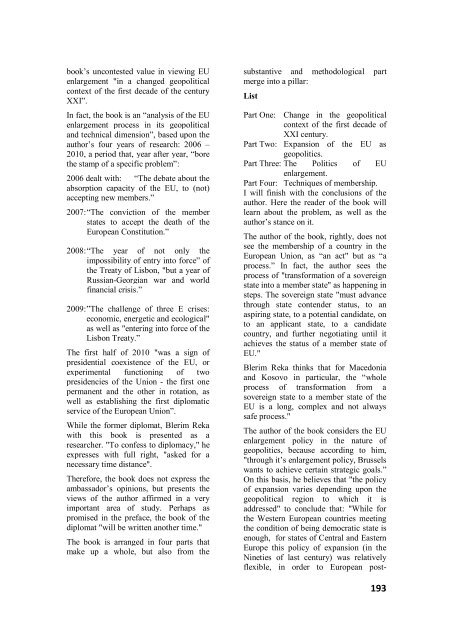SEEU Review vol. 6 Nr. 2 (pdf) - South East European University
SEEU Review vol. 6 Nr. 2 (pdf) - South East European University
SEEU Review vol. 6 Nr. 2 (pdf) - South East European University
Create successful ePaper yourself
Turn your PDF publications into a flip-book with our unique Google optimized e-Paper software.
ook’s uncontested value in viewing EUenlargement "in a changed geopoliticalcontext of the first decade of the centuryXXI”.In fact, the book is an “analysis of the EUenlargement process in its geopoliticaland technical dimension”, based upon theauthor’s four years of research: 2006 –2010, a period that, year after year, “borethe stamp of a specific problem”:2006 dealt with: “The debate about theabsorption capacity of the EU, to (not)accepting new members.”2007: “The conviction of the memberstates to accept the death of the<strong>European</strong> Constitution.”2008: “The year of not only theimpossibility of entry into force” ofthe Treaty of Lisbon, "but a year ofRussian-Georgian war and worldfinancial crisis.”2009: ”The challenge of three E crises:economic, energetic and ecological"as well as "entering into force of theLisbon Treaty.”The first half of 2010 "was a sign ofpresidential coexistence of the EU, orexperimental functioning of twopresidencies of the Union - the first onepermanent and the other in rotation, aswell as establishing the first diplomaticservice of the <strong>European</strong> Union”.While the former diplomat, Blerim Rekawith this book is presented as aresearcher. "To confess to diplomacy," heexpresses with full right, "asked for anecessary time distance".Therefore, the book does not express theambassador’s opinions, but presents theviews of the author affirmed in a veryimportant area of study. Perhaps aspromised in the preface, the book of thediplomat "will be written another time."The book is arranged in four parts thatmake up a whole, but also from thesubstantive and methodological partmerge into a pillar:ListPart One: Change in the geopoliticalcontext of the first decade ofXXI century.Part Two: Expansion of the EU asgeopolitics.Part Three: The Politics of EUenlargement.Part Four: Techniques of membership.I will finish with the conclusions of theauthor. Here the reader of the book willlearn about the problem, as well as theauthor’s stance on it.The author of the book, rightly, does notsee the membership of a country in the<strong>European</strong> Union, as “an act" but as “aprocess.” In fact, the author sees theprocess of "transformation of a sovereignstate into a member state" as happening insteps. The sovereign state "must advancethrough state contender status, to anaspiring state, to a potential candidate, onto an applicant state, to a candidatecountry, and further negotiating until itachieves the status of a member state ofEU."Blerim Reka thinks that for Macedoniaand Kosovo in particular, the “wholeprocess of transformation from asovereign state to a member state of theEU is a long, complex and not alwayssafe process."The author of the book considers the EUenlargement policy in the nature ofgeopolitics, because according to him,"through it’s enlargement policy, Brusselswants to achieve certain strategic goals.”On this basis, he believes that "the policyof expansion varies depending upon thegeopolitical region to which it isaddressed" to conclude that: "While forthe Western <strong>European</strong> countries meetingthe condition of being democratic state isenough, for states of Central and <strong>East</strong>ernEurope this policy of expansion (in theNineties of last century) was relativelyflexible, in order to <strong>European</strong> post-193
















